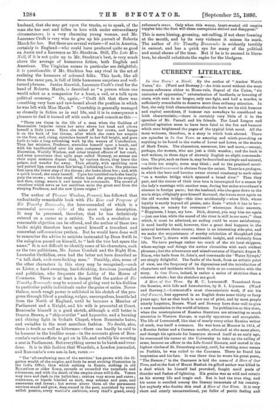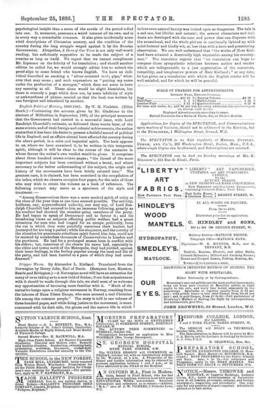A Hero of Our Time. By M. U. Lermontoff. Translated
from the Russian, with Life and Introduction, by R. I. Lipmann. (Ward and Downey.)—Lermontoff's most characteristic work, if not his chef d'ceuvre, first appeared in an English dress some thirty or forty years ago; but as that book is now out of print, and by most people utterly forgotten, Messrs. Ward and Downey have done well to give a new translation to the world of letters. Its publication at this time, when the masterpieces of Russian literature are attracting so much attention in Western Europe, is equally opportune and acceptable. The life of Lermontoff, like that of nearly every other Russian writer of mark, was itself a romance. He was born at Moscow in 1814, of a Russian father and a German mother, educated at the same place, and though his aptitude for literature showed itself at an early age, he renounced his career at the University to take up the calling of arms, became an officer in the Life Guard Hussars, and moved in the highest circles of St. Petersburg society, until, for writing some verses on Pushkin, he was exiled to the Caucasus. There he found his inspiration and his fate. It was there that he wrote his great poem, "The Demon ;" in the Caucasus is laid the scene of A Hero of Our Time, and at the foot of Mount Mashak its gifted author was killed in a duel which he himself had provoked, fought amid peals of thunder and flashes of lightning. His genies was as wild and erratic as his stormy life and tragic end. Bat it had the true ring, and his name is enrolled among the literary immortals of his country. Let anybody who doubts this read A Hero of Oar Time. It is very short and utterly unconventional, yet faller of poetio feeling and psychological insight than a score of the novels of the period rolled into one. It, moreover, possesses a weird interest all its own, and is in every way a remarkable romance. It also gives incidentally some vivid descriptions of Circassian scenery, and the condition of the country during the long struggle waged against it by the Russian Government. Altogether, A Hero of Our Time is not only well worth reading, but sufficiently suggestive to be made the subject of a treatise as long as itself. We regret that we cannot compliment Mr. Lipmann on the felicity of his translation ; and should another edition be called for, we would strongly advise him to submit the proof-slips to some friend who knows English. We have an indi- vidual described as smoking a "silver-mounted milky pipe," what- ever that may mean ; and such expressions as "putting my name under the production of a stranger," which does not seem to have any meaning at all. These alone would be slight blemishes, but there is scarcely a page which does not, by some infelicity of style or awkwardness of phrase, remind us that the book was written by one foreigner and translated by another.



































 Previous page
Previous page